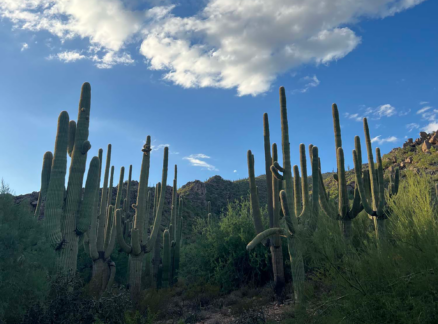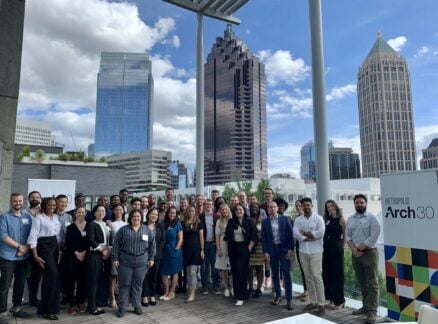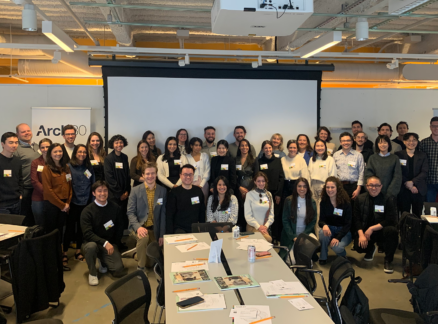January 1, 2007
Organic Barn Raising
For a Slow Food restaurant in San Francisco, Cass Calder Smith deploys recycled materials for durability with a popular appeal.
For anyone willing to pay a premium, it’s relatively easy to embrace an environmentally sustainable way of life in San Francisco. There are biodiesel fuel stations, organic markets, even holistic pet stores. But Mark Lewis and Matthew Guelke are working toward a day when everyone will live this way—not just those with the means. Their organic café, Lettüs, aims to bridge the gap between local-ingredient guru Alice Waters and McDonald’s founder Ray Kroc.
Under the guidance of executive chef Sascha Weiss, Lettüs’s Asian-influenced menu is almost entirely organic and relies heavily on what is available from local farms, dairies, and ranches. Weiss, Lewis, and Guelke consider themselves members of the Slow Food movement, which advocates knowing where your food comes from and supporting traditional and sustainable farming practices. But Lettüs does not aim to create more fetishism in the already food-centric Bay Area. “Instead of being pretentious or formal, we said, ‘It’s a farm. Come eat at our table,’” Lewis says. He envisions a near future when organic cafés are as prolific as fast-food chains. “That’s how we’ll change the way the world eats,” he says. “It’s not by having one great restaurant—it’s by having one on every block.”
The two owners wanted their philosophy to permeate every aspect of the project, including the architecture. In addition to following green principles, the design would need to feel casual and accessible in order to make eating there an everyday occasion. And it would be modern, to reach beyond the earthy-crunchy crowd and lure in a new kind of customer. “The earthier places are great, but a lot of their clientele already eats this way,” Guelke says. “We wanted to make a place that caters more to the mainstream, where people come in because of the design of the space and the kinds of dishes we’re offering.”
The firm they chose to create that environment—CCS Architecture, founded by Cass Calder Smith—was a rare blend of all these requirements. Smith grew up on a commune near Santa Cruz and studied solar energy in the 1980s, but today he is best known for crisp Modernist dining environments such as Restaurant LuLu, in San Francisco, and the Wild Goose, on Lake Tahoe. Lewis and Guelke particularly liked the feel of the cafés Smith designed in San Francisco’s recently renovated Ferry Building Marketplace, a former ferry terminal turned high-end farmers’ market. “When we said to Cass that we wanted to be the waiting room of a Finnish sauna set in a Tokyo airport, he got it,” Lewis says.
But holding the design to the high green standards of Weiss’s food proved difficult. Smith, who has built a number of green residences, says sustainable restaurants are much more challenging. “Restaurants really wear out fast,” he says. “Most sustainable materials are not strong enough for the impact and friction of heavy use.” And since Lewis and Guelke wanted to keep their food affordable, the budget was limited. In fact their first design decision was to choose an existing space that had been a French bakery before and keep the kitchen intact. As Smith points out, this is recycling on a grand scale, and in some ways it’s greener and less wasteful than doing all new construction with sustainable materials.
Instead of searching high and low for a broad palette of green materials, Smith chose one wood for almost everything: walls, ceilings, tabletops, shelving—even the bathroom counter. “When you’re doing organic food, I think a wooden background is as important as the plate,” Smith says. “It creates this feeling that’s warm and familiar—it’s kind of domestic.” Obviously the lumber could not be freshly harvested from an endangered forest. Instead Smith chose hickory reclaimed from a 186-year-old barn in Gilson, Illinois and acquired by Restoration Timber. “Hickory is a really beautiful wood,” he says, “and it’s even better when it’s this recycled version—it’s more alive as far as grain and color and range.”
To reflect the Slow Food movement’s at-tention to where food comes from, Lewis and Guelke wanted natural fabrics and a stonelike floor. CCS chose wool upholstery from Maharam in a mossy green. The fabric is 100 percent natural and will not off-gas toxic chemicals into the air—an environmental complement to Weiss’s organic food. The floor is covered with all-natural tiles from Royal Mosa, a company that recaptures and recycles all of its waste, from pigments to gas particulates. The tiles themselves are recyclable and do not emit toxins.
Lettüs opened in December 2005, and if the café’s current success is any indication, San Franciscans may be seeing more locations in the future. The recipe of affordable organic food in a casual upscale environment may even have changed the way some locals eat. “We wanted a place where people could eat four or five days a week—and it’s worked,” Guelke says, gesturing toward a customer reading the paper over a late lunch. “That woman over there has been in twice today.”
“We like to think of our customers as re-newable and sustainable,” Lewis quips. “We want to keep them coming back.”





